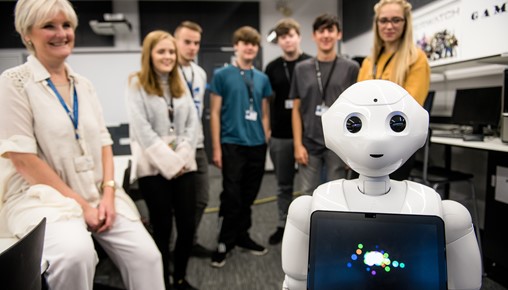
Principles of Cyber Security Level 2

- Length 12 Weeks
- Study Online Learning
- Location Online
Qualification Gained
Level 2 certificate in Principles of Cyber Security NCFE Cache
Levels ExplainedMore about the course
In an increasingly digital world, cyber security is fast becoming a main concern for many organisations. With complex online scams and cyber crime, it’s essential that organisations have an understanding of preventative measures to maintain cyber security, including techniques and security checks needed to store data securely.
This online course is a key starting point for anyone looking to begin their career in cyber security.
Course information
Learning will take place via an online platform, and you will be able to learn at a time that suits you without the need to attend college.
At the start of your course, you will be allocated a tutor who will support you through your qualification, and you will be provided with all learning and assessment materials which have been specifically developed to support you in meeting the qualification requirements.
Your tutor will also provide you with written feedback on the assessments you submit, as well as ongoing support through a remote tutorial.
How often does this course run?
Start dates for this course are flexible and can be joined anytime throughout the year. Once you have made your application, one of our advisers will be in touch to discuss your preferred start date.
Entry requirements
- A good level of English is required
What will I achieve?
If you successfully complete this course, you will receive a Level 2 certificate in Principles of Cyber Security NCFE Cache
What will I learn?
- Introduction to cyber security
- Understand terminology used in cyber security
- Understand legal and ethical aspects of cyber security
- Understand common threats to cyber security
- Understand methods of maintaining cyber security
- Working with others in cyber security
How will I be assessed?
- Assessments
Course costs
This course is free if you are on an income related benefit, or you are on a low income (a household income of less than £25,750).
If you are 19 and over, please call our Student Services team to confirm the fee for this course. Course costs may be subject to change.
If you require information on any financial support that may be available to you with fees or study costs on this course, please contact Student Services who will be able to offer advice and assistance on accessing any financial support that may be available.
Adult Funding Changes
Due to the changes in Government funding from the 1st of August 2019, students who resident in postcodes within Merseyside and Greater Manchester may be unable to access funding from training providers and colleges in Lancashire. You may have to pay all associated course and support costs.
To check if your postcode is part of the new devolved funding legislation, please contact our Course Enquiries team for further future.
Contact our team
Meet our students and tutors

Lewis
Digital Alumni StudentI thoroughly enjoyed working with the software and coding units, and I appreciated how the course could prepare me for university and future career opportunities. I would recommend West Lancashire College to any high school student who is already thinking about their future. The facilities in the IT department are exceptional, and as a former student at another college, I could see the difference. West Lancashire College provided a supportive, friendly, and safe environment, and I would highly recommend it to everyone.
What can I do with a qualification in Computer Science?
Daily tasks:
- Stays abreast of relevant legislation, considers its impact on the organisation.
- Considers alternative work procedures to improve productivity.
- Examines and reports on company and departmental structures, chains of command, information flows, etc. and evaluates efficiency of existing operations.
- Develops and administers salary, health and safety and promotion policies.
- Undertakes industrial relations negotiations with employees.
- Provides or arranges for provision of training courses.
- Oversees the monitoring of employee performance and career development needs.
- Oversees the preparation of job descriptions, drafts advertisements and interviews candidates.
- Determines staffing needs.
Daily tasks:
- Ensures that new technologies are researched and evaluated in the light of the organisation.
- Prioritises and schedules major IT/telecommunications projects.
- Considers the required IT/telecommunications staffing levels, oversees recruitment and appointment of staff and directs training policy.
- Develops the periodic business plan and operational budget for IT/telecommunications to deliver agreed service levels.
- Directs the implementation within the organisation of IT/telecommunications strategy, infrastructure, procurement, procedures and standards.
- Develops in consultation with other senior management the IT/telecommunications strategy of the organisation.
Daily tasks:
- Reports on IT activities to senior management.
- Plans and monitors work and maintenance schedules to ensure agreed service levels are achieved.
- Supervises the technical team and coordinates training.
- Takes responsibility for managing the development of a specialist aspect of IT provision such as user support, network operations, service delivery or quality control.
- Liaises with users, senior staff and internal/external clients to clarify IT requirements and development needs.
- Plans, coordinates and manages the organisation.
Daily tasks:
- Reports on project or programme to senior management and/or client.
- Coordinates and oversees implementation of the project or programme.
- Monitors progress including project/programme budget, timescale and quality.
- Manages third party contributions to the programme or project.
- Coordinates and supervises the activities of the project/programme team.
- Plans the stages of the project or programme, reviews actions and amends plans as necessary.
- Works with client or senior management to establish and clarify the aims, objectives and requirements of the IT project or programme.
Daily tasks:
- Works closely with clients to implement new systems.
- Researches, analyses, evaluates and monitors network infrastructure and performance.
- Examines existing business models and flows of data and designs functional specifications and test plans for new systems in order to meet clients.
- Provides advice and assistance in the procurement, provision, delivery, installation, maintenance and use of IT systems and their environments.
- Communicates the impact of emerging technologies to clients and advises upon the potential introduction of such technology.
- Undertakes feasibility studies for major IT developments incorporating costs and benefits, and presents proposals to clients.
- Liaises with internal/external clients in order to analyse business procedure, clarify clients.
Daily tasks:
- Writes operational documentation and provides subsequent support and training for users.
- Plans and maintains database structures.
- Implements and evaluates the software.
- Writes code for specialist programming for computer games, (for example, artificial intelligence, 3D engine development).
- Tests and corrects software programs.
- Develops user interfaces.
- Writes and codes individual programs according to specifications.
- Undertakes feasibility study to design software solutions.
- Examines existing software and determines requirements for new/modified systems in the light of business needs.
Daily tasks:
- Activates the 'live' website.
- Tests website interaction and performance prior to going 'live'.
- Writes and publishes content for the website.
- Establishes methods to ensure appropriate website security and recovery.
- Designs and develops web interfaces for relational database systems.
- Develops the website and applications.
- Designs web pages including graphics, animation and functionality to maximise visual effectiveness and facilitate appropriate access.
- Presents design options to the client.
- Liaises with internal/external client in order to define the requirements for the website.
Daily tasks:
- Deals with and reports on breaches in security.
- Examines IT system for potential threats to its security and integrity and draws up plans for disaster recovery if security is compromised.
- Makes recommendations concerning software/system quality.
- Develops quality standards and validation techniques.
- Develops, implements and documents test plans for IT software, systems and computer games.
- Undertakes the testing of software, systems or computer games for errors, identifies source of problems and proposes solutions.
Daily tasks:
- Acts as a liaison between users, outside suppliers, and other technical teams.
- Performs server backup and recovery operations and restarts systems following outages.
- Identifies problems, agrees remedial action and undertakes emergency maintenance if required.
- Analyses systems and makes recommendations to improve performance.
- Schedules and performs system maintenance tasks, such as loading user applications, programs and data.
- Configures and sets up new server systems.
- Administers, monitors and supports internal/external networks, servers, email, database and security systems.
Daily tasks:
- Reports on commonly occurring queries to detect underlying problems.
- Maintains a log of work in progress, calls received, actions taken and problems detected.
- Researches possible solutions in user guides, technical manuals and other documents.
- Refers more complex or intractable problems to appropriate IT professionals.
- Facilitates user access to systems.
- Installs and upgrades hardware, cables, operating systems and/or appropriate software.
- Advises users on how to resolve hardware and software problems.
- Provides technical support to IT users.
Digital at West Lancashire College

News
Upcoming events

April Open Event
West Lancashire College
Thursday 30th April 2026
4:30pm - 7:00pm
Either
- The level required to start the course
- The level rewarded when completing the course
Course Added
This course has now been added to your basket. Please click below to apply now or contine browsing.
Apply Now

